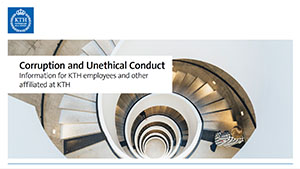Travel
The need to travel must always be pre-assessed. To the extent possible, travel shall be replaced by digital alternatives, such as online, video or phone conferencing. By meeting without travelling, you contribute to all three aspects of sustainable development, i.e. reduced environmental impact, economic savings, and social benefit.
Decisions on business travel must be ordered and approved by your manager before booking travel. A business trip longer than 100 kilometres must be ordered through an approved travel order.
Learn more about business travel online and in the KTH Guidelines for meetings and travel.
How do I know?
If my manager has approved that I travel for work, travel and hotels must always be booked through the procured travel agency. Business travel must have a purpose that relates to the needs of agency activities. The main rule is that KTH only reimburses travel and hotels booked through the procured travel agency. In cases where accommodation is included and the hotel has already been booked/selected by the course or conference organiser (which should be a favourable conference hotel package with a code) for all attendees, you may book through the organiser. All business travel must be planned and carried out in accordance with current guidelines. This means that environmental impact and costs must be kept to a minimum and that the trip must be carried out within a reasonable duration of time while still achieving reasonable comfort and safety.
Personal bonus points and benefits offered by a travel operator in connection with business travel may only be used for business travel and not for private travel.
If you are unsure about the rules for travel, please for advice.

